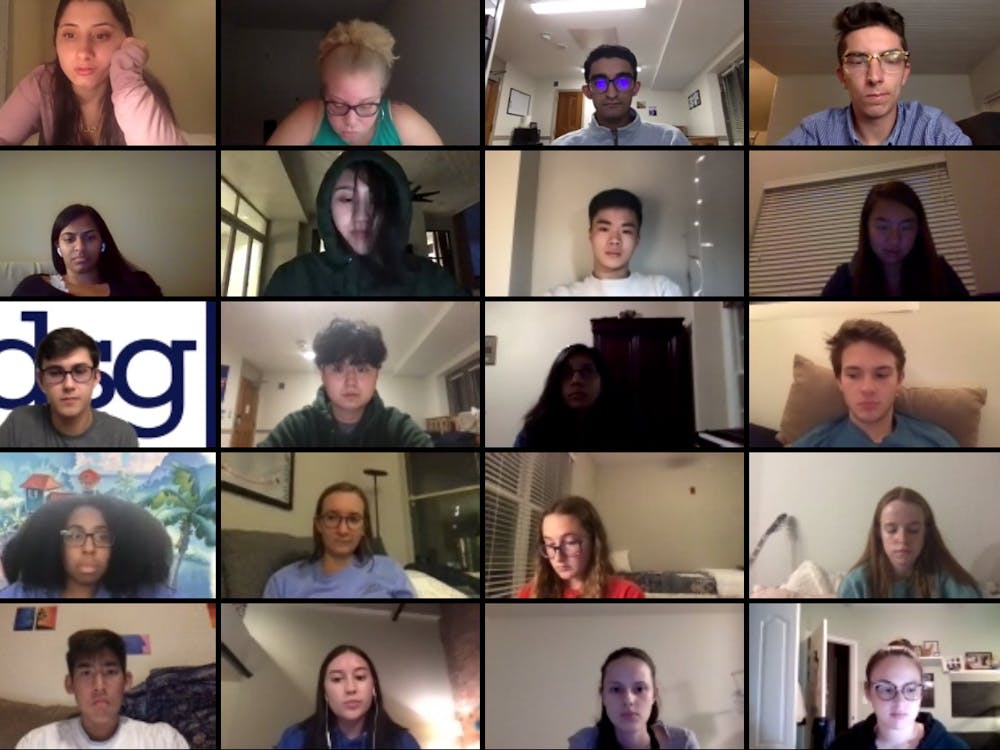After a series of election snafus last year, Duke Student Government is rewriting its election procedures.
During the spring 2020 election cycle, the DSG Judiciary reviewed five cases regarding elections. In response to the litany of complaints, the Judiciary issued a scathing report that argued that "DSG places little value in adhering to” its own governing documents and accused it of acting "in an offensively negligent manner" by failing to make those documents accessible to undergraduates.
Now Attorney General Jason Scharff, a senior, has overhauled the DSG elections rulebook, he told the DSG Senate at its Wednesday Zoom meeting, the first of the fall semester. The Senate unanimously approved the rule changes.
While changes to DSG governing documents are usually highlighted when presented to the Senate, the number of changes to the election rules was so unusually high that Scharff instead presented a full list in a separate document.
Under the old rules, when a candidate broke an election rule, DSG docked a set number of votes according to the issue at hand. Now, violations of DSG election rules are grouped into three categories:
- Level 1 violations—small, unintentional mistakes—will go unpunished, and DSG will now direct candidates to fix the problems instead.
- Level 2 violations—which are committed by a campaign team member and harm another candidate or candidates—will result in temporary suspensions of the campaign, including spending and campaigning, for a set length of time.
- Level 3 violations—the most serious type, which either cause irreversible harm to another candidate or put the entire election in jeopardy—will result in a candidate being disqualified.
The new rules are overseen by a new Board of Elections, which is composed of four to eight senators that are confirmed by the full DSG Senate. Senator Shirley Mathur, a junior, and Senators Devan Desai, Cynthia Dong and Lana Gesinsky, all sophomores, were unanimously confirmed to the board Wednesday night.
"I wanted to join this board because I think that it's really important that elections go smoothly," Dong said.
This is not Scharff's first involvement with DSG elections. In one of the five Judiciary cases last year, Scharff filed a petition accusing then-Attorney General John Markis, a junior, of using "priming language" in an email to undergraduates about voting in the 2020 Young Trustee election. The Judiciary concluded that Markis had not violated the DSG Constitution or bylaws and dismissed the case, but found that Markis had “overstepped the purview” of his role as attorney general.
Along with announcing new rules, the Senate discussed first-year senator elections, which will occur Sept. 10-11. Candidates will have to collect 25 electronic signatures from first-years and submit them to Scharff by Sept. 6. As part of an effort to encourage students to run for positions, all senators at Wednesday's meeting were asked to post a "Run for DSG" graphic on Instagram.
Other Business
DSG Executive Vice President Dina Qiryaqoz, a junior, led the Senate meeting, which is usually overseen by the president pro tempore. President Tommy Hessel, a senior, wrote in an email that Qiryaqoz was filling in for senior Valeria Silombria, who was elected to that position last year.
Dong—who is one of the new Board of Elections members—was also nominated and confirmed to the Bass Connections Faculty Advisory Council, which will meet three times in the fall semester. Senator Dawei Gao, a sophomore, was nominated to the council but declined the nomination.
Drew Flanagan, a sophomore and chair of the Student Organization Finance Committee, presented four nominations for SOFC positions, all of which were unanimously confirmed: Executive Vice Chair Ahana Sen, Senior Advisor Ellen Hirsberg, Event Services Analyst Florence Wang and Mounika Adepu, vice chair of analytics and engagement. Sen and Hirsberg are juniors; Wang and Adepu are sophomores.
DSG recognized two new student groups and chartered two existing ones.
The two newly recognized groups are the Transfer Student Union, which will provide programming, information and support to transfer students, and Duke Students Demand Action, which will focus on gun violence prevention. The Senate also unanimously chartered the Student Collaborative on Health Policy, which is affiliated with the Duke-Margolis Health Policy Center, and the Duke QuestBridge chapter, which will provide support for QuestBridge Scholars at Duke.
The Senate approved a status change for Duke Simple Charity, the Duke chapter of a Christian nonprofit founded by Brian Grasso, Trinity '18. The group had applied for a status change that will allow the group to receive funding for more group-focused events, rather than Duke-community-wide, Flanagan said.
Get The Chronicle straight to your inbox
Signup for our weekly newsletter. Cancel at any time.
Carter Forinash, Trinity '21, was the news editor for The Chronicle's 116th volume.

